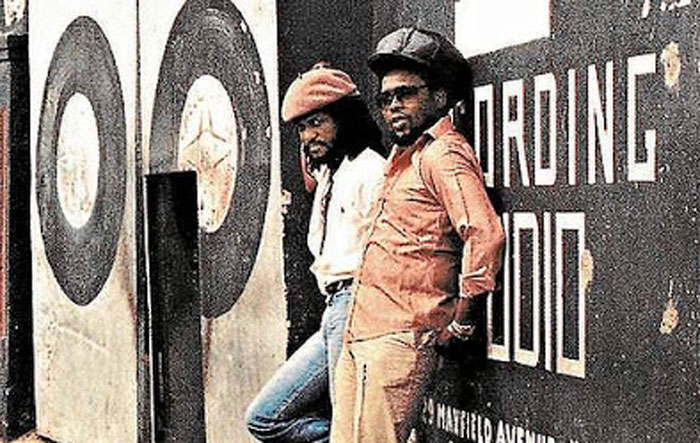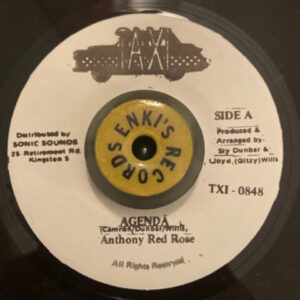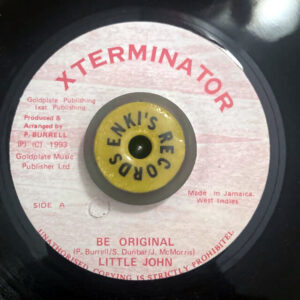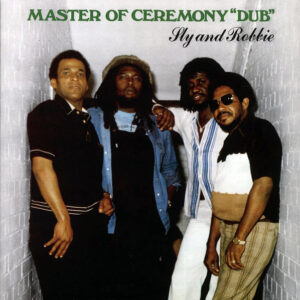This article was published in 2020 and was last updated on 26 January 2026.
The rhythms of drummer Sly Dunbar and bassist Robbie Shakespeare – Sly & Robbie – have been the driving force behind numerous songs, dubs and remixes since the mid-1970s, not only with major Jamaican artists but also international stars like Bob Dylan and the Rolling Stones.
Sly and Robbie were already famous artists in Jamaica prior to pairing up as a duo in 1975. Lowell Charles Dunbar, whose nickname Sly derived from his adoration of Sly Stone, began his career in the late ’60s, when he was just 15, playing in studio bands. He made his recorded debut on the single Night Doctor with the Upsetters, impressing producer Lee Perry.
Robbie Shakespeare also began his career as a teenager and by the early 1970s he was already a member of Bunny Lee’s house band The Aggrovators.
Sly and Robbie met in 1972 but started working together three years later, when producer JoJo Hookim had them join his studio band the Revolutionaries.
Their first work as partners was on Jimmy Cliff’s Follow My Mind that same year, when they also oversaw one of the greatest albums of the roots age – Culture’s Two Sevens Clash.
Sly & Robbie began to be recognized internationally especially after joining DJ U-Roy’s backing band for his UK Tour, and accompanying Peter Tosh in his international tours for 4 years.
Meanwhile, they kept working in Jamaica on many successes, including Leroy Smart’s Super Star album, which credits Robbie Shakespeare & the Aggrovators and Sly Dunbar & the Revolutionaries.
They eventually founded their own label, Taxi Records, and formed their house band – Taxi All Stars, also known as The Roots Radics – with members of the Revolutionaries. The label debuted with Black Uhuru’sObserve Life and soon had its first chart hit with Gregory Isaacs’ Soon Forward, followed by collaborations with Junior Delgado, The Wailing Souls, Dennis Brown, among others.
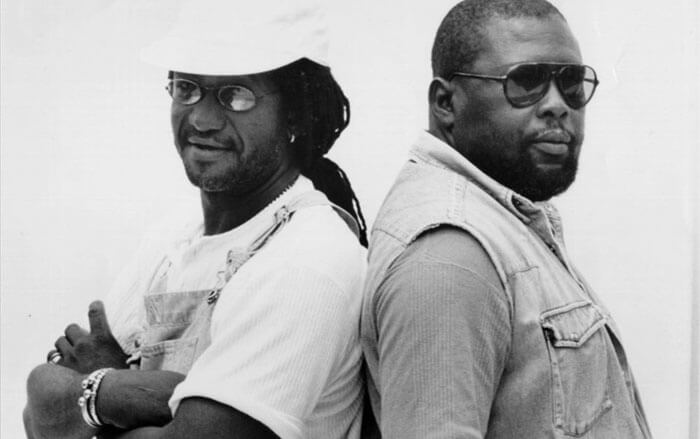
Also known as “the Riddim Twins”, Sly & Robbie continued their outside session work by providing the pulsing rhythms for Bunny Wailer, the Mighty Diamonds, Jacob Miller, and DJ stars like Ranking Dread and Barrington Levy.
Their most crucial work was with Black Uhuru, with whom they produced powerful albums and played live concerts, enriching the group’s phenomenal vocal performance. Sky & Robbie played in the tour opening for the Rolling Stones as part of Black Uhuru’s backing band.
In the early 1980s, the Riddim Twins worked with avant-garde singer Grace Jones, creating funky and dubby sounds that set fire to dance clubs around the world and impacted the new wave scene. The duo was also increasingly fascinated by dub, which led – for example – to Crucial Reggae: Driven by Sly & Robbie and A Dub Experience.
The pair’s close connection to the dancehalls and their ever more experimental electronic sounds, foreshadowed the rise of ragga, and Sly & Robbie’s productions provided the blueprint for the eventual rise of ragga and the digital revolution. Dunbar’s mechanized beats were so far afield from what others were creating as to be off the map entirely, while Shakespeare’s sinuous bass adds a rich organic feel to the sound.
Through the 1980s, in addition to championing upcoming talent such as Ini Kamoze, and working on the creation of hits for Jamaican stars like Sugar Minott and Frankie Paul, Sly & Robbie also worked with international artists. Examples include Joe Cocker, Bob Dylan and the Rolling Stones. In 1989, “Hitbound! The Revolutionary Sound of Channel One” by Heartbeat Records featured some the most legendary work by Sly & Robbie, with artists like Horace Andy, Junior Byles, the Mighty Diamonds and the Meditations.
The 1990s were mostly about DJ Style reggae and dancehall for Sly & Robbie. In fact, the new decade opened with DJ Riot, a title that accurately summed up the album’s intent. The due oversaw hit singles and albums by Shabba Ranks, Chaka Demus & Pliers, Beenie Man, and Luciano, among others. They also worked in the jazz genre with Monty Alexander for the Monty Meets Sly & Robbie album.
The music kept on coming throughout the 2000s, when their Rhythm Doubles was nominated for a Best Reggae Album Grammy. Sly & Robbie also continued working with reggae icons, such as Horace Andy, and even pop icons, like Britney Spears and Paul McCartney.
In 2012, The Riddim Twins returned with Blackwood Dub, their first traditional dub album in years, followed by Underwater Dub two years later.
Since and up to 2020, they collaborated with international groups and artists, from Japan to Canada, on works that range from reggae to dub and dance.
Robbie Shakespeare died on 8 December 2021, at the age of 68, while Sly Dunbar died on 26 January 2026, at the age of 73.
Records tagged ‘Sly & Robbie’
Source: Artist Biography by Jo-Ann Greene on allmusic.com
Photos from etseven7.com and dubdotdash.blogspot.com

